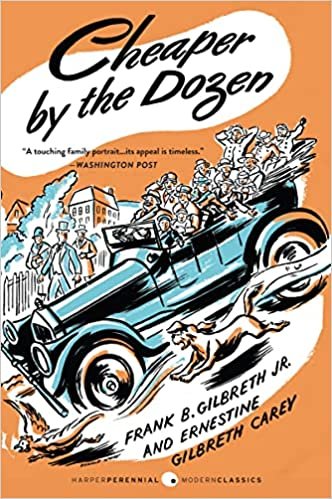Efficiency
When I was little, I loved Cheaper by the Dozen and the stories of the Gilbreth family. Cheaper by the Dozen tells the life of Frank Gilbreth, his wife Lillian and their twelve children. Frank was a motion study researcher- looking at ways that one’s movements could be changed in order to speed up the process of rote activity, say bricklaying (where Frank began his ideas) . Using the new technology of motion pictures, he would film and then calculate various movements to ensure efficiency. He studied, developed and applied his theories on the home front much to the dismay of his children. He even “worked” when the children had their tonsils removed- setting up a surgical theater in the parlor in order to film the proceedings.
The idea of time study has always intrigued me: how can I do an activity or rote action faster and easier? In college, I dated a fellow who was studying engineering. In our first introduction, he was amazed that I knew anything at all about efficiency engineering, the debate between Frank Bunker Gilbreth and Frederick Winslow Taylor and time/motion study.
I have always been fascinated by workers who are efficient in their jobs: nursing assistants, plasterers, cooks, to name a few. People who with dexterity, quickness and assurance, perform their tasks with ease. In college I had a variety of jobs. Once, I worked in a nursing home and was in awe of the senior nursing assistants who could manage a heavy patient load- getting the residents bathed, dressed and into their chairs. The efficiency of their movements as they rolled patients, changed linens, tidied up the space was amazing to a fresh-faced young nursing student. (Of course, it didn’t take me long to realize that some of them just wanted to get the morning work over so they could sit down for the rest of their shift and have their cigarettes!)
At another job working in a deli/bakery, the baker was amazing. Patti, a slight woman but with strong arms, would deftly whip a spatula around a bowl, drop the doughy mass onto the counter and kneed it with such quick movements. In one or two movements with her hands, she would form the desired loaf and leave them to rise.
But for all this time saving movements, I wonder why save the time? Is there a “time bank”? The way we speak about time, one would think there is: one can lose or gain time, “time is money”, “time is of the essence”. Is time and efficiency the same thing? Is efficiency all it is cracked up to be?
I hate being inefficient. There is the maxim in business that you should only touch a piece of paper once: if you pick up a file, do something with it, don’t put it down and pick it up again. Same could be said with emails- once opened, either respond or delete.
Recently, we have had many projects going on in our household. Some things have to wait until others are completed. I am finding that we are in a “holding” pattern where we cannot do progress. This makes me nervous because I know that once, that which we are waiting becomes completed, a torrent of work needs to occur immediately. I am wondering while in this holding/waiting time if I am using my time wisely. I am finding that I am “touching the paper” more than once.
But some things cannot be rushed nor can they be a “once and done”. Instead of efficiency, much of life needs to be cultivated, similarly to gardening. Many actions in gardening are annual activities. There is no such thing as a finished garden. Repeated actions foster growth: breaking up or loosening the soil, repetitively going over a space, adding nutrients, removing weeds, watering, dividing plants.
I think of how we have to cultivate relationships. Our relationships are never “finished” if we are growing and learning together. Like gardening there are continual activities that help foster the growth: communicating, sharing meals, engaging in activities, helping each other, celebrating good times. I don’t think someone would want to have a once-and-done relationship. Sounds like an oxymoron. That is not a relationship but a transaction.
I think of inventions that took time (does that mean that the intervening years were “inefficient?): the can opener wasn’t invented until 45 years after cans were invented; the screw driver was invented hundreds of years after the invention of the screw; friction matches (as opposed to the flint and steel) were not invented until 1826, and the steering wheel was invented 8 years after the car.
What about you? Have you ever thought about efficiency? Where does it fit in your life? With everything that you do? Not at all? What do you cultivate? What in your life has taken time? Is that counter to being efficient?
The ongoing question I ask myself regarding efficiency and time- if I am so efficient with my time, what am I doing with the time I have “saved”? Am I spending time cultivating the things that God wants me too? Does that free me up to “do justice, love mercy, and walk humbly with God” (Micah 6:8)?

